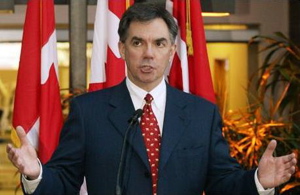
[Editor's note: The Tyee published on October 20 a news item on its Hook blog summarizing a newly released report by Environmental Defence urging the federal government to increase regulations on oil sands development, and lobby less on behalf of Alberta's oil interests. That article drew a response from Environment Minister Jim Prentice, published by The Tyee on October 27. Now Environmental Defence has sent The Tyee a response to Prentice. In the interest of facilitating an important discussion, we publish that piece here.]
Let's begin with what may be a surprise: we at Environmental Defence agree with much of what federal Environment Minister Prentice has said in theTyee.ca recently regarding the tar sands industry. In particular, we were pleased with his comment on that industry's role in meeting national greenhouse pollution reduction targets -- that he intends ". . . to deal with all sorts of emissions in Canada in order to achieve those targets," and that "No one, including the oil sands, will receive a bye in that process."
The reason that we were pleased is that this would amount to fundamental change in the industry instead of the tinkering around the edges that regulators have so far failed to sell the public on. As our recent report indicated, on its current trajectory the tar sands industry is on track to release more than three times its fair share of national carbon emissions by 2020, and more than 40 times by 2050, even if you are a wild-eyed optimist about the use of carbon capture and storage. If you are not, and many thoughtful people aren't, then those numbers get even worse.
Series of false starts
After initially saying it would wait for the U.S. to move on carbon pollution, our federal government has subsequently proceeded with not waiting, and is taking a sector-by-sector approach to regulating. First up have been the transportation and coal-fired power sectors. The proposed regulations in these sectors have not exactly been stellar (see here), but they have set up this inescapable conclusion: at some point the federal government must get around to regulating tar sands pollution, and if we take Minister Prentice at face value about meeting targets and all sectors doing their fair share, this must by necessity bring fundamental change to the tar sands industry.
We've had a number of false starts on this front, with multiple federal climate 'plans' being announced and not implemented. The most recent revelation had awful timing -- during the Copenhagen climate talks last December, CBC obtained confidential cabinet documents that suggested Ottawa let tar sands emissions more than triple by 2020, instead of cutting them in line with that sector doing its fair share alongside others, and in line with Minister Prentice's statement above.
So, we look forward to the federal government proposing carbon regulations for the tar sands sector that reduce its absolute emissions in line with the federal targets, and even better, in line with where science says we need to be. Anything else will place undue burden on other sectors and other regions of Canada to do even more, or mean missing our national targets, or both.
A range of tar sands hazards
Of course, carbon isn't the only area where Ottawa must fulfill its responsibilities. While we transition away from oil to a truly clean energy economy, the worst impacts of tar sands activities must be better mitigated, including the growing amounts of toxic waste, the ongoing destruction of habitat for endangered species like caribou, and increasing acid rain falling on neighbouring Saskatchewan. There's also the fact that there's no foolproof way to stop those ducks from landing on those toxic tailings ponds, so the only answer there (as even Alberta Premier Stelmach has said) is to get rid of them entirely -- the ponds, that is, not the ducks.
As our report indicates, all of these problems fall to the federal government to fix, and all of these problems added together are the reason that Canada's environmental reputation is suffering so badly around the world. We won't recover until Ottawa enforces its laws and gets the growing problems in the tar sands under control. ![]()
Read more: Energy, Politics, Environment














Tyee Commenting Guidelines
Comments that violate guidelines risk being deleted, and violations may result in a temporary or permanent user ban. Maintain the spirit of good conversation to stay in the discussion.
*Please note The Tyee is not a forum for spreading misinformation about COVID-19, denying its existence or minimizing its risk to public health.
Do:
Do not: